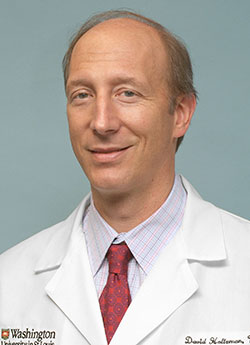Holtzman awarded Watanabe Prize in Translational Research
Recognized for developing potential therapies for Alzheimer’s disease

Holtzman
David Holtzman, MD, the Andrew B. and Gretchen P. Jones Professor and head of the Department of Neurology at Washington University School of Medicine in St. Louis, has received the August M. Watanabe Prize in Translational Research from the Indiana Clinical and Translational Sciences Institute. He was recognized for his work uncovering the causes of Alzheimer’s disease and translating an understanding of its basic biology into potential therapies.
Holtzman, together with scientists in his lab, discovered that the protein amyloid beta – which collects into clumps in the brains of people with Alzheimer’s – is a byproduct of the normal activity of neurons, and that levels of amyloid beta are high during wakefulness and lower during sleep. His lab also has helped reveal that APOE, the biggest genetic risk factor for Alzheimer’s, affects the accumulation of amyloid plaques as well as damage caused by a second Alzheimer’s protein: tau. On the therapeutic side, he helped develop antibodies that reduce brain deposits of amyloid beta. One such antibody, called solanezumab, is now in clinical trials as a potential prevention for Alzheimer’s.
Holtzman also showed that tau spreads through the brain, damaging neurons and triggering cognitive decline. With colleagues, he identified antibodies that lessened the spread of tau, reducing brain atrophy and signs of cognitive impairment in animal studies. One such tau antibody from his lab is also in a clinical trial for Alzheimer’s.
The Watanabe Prize recognizes the people who shepherd scientific discoveries into new therapies for patients. It is named for August Watanabe, a titan in the field of translational research who impacted the health of people around the world as a leader at Indiana University and Eli Lilly and Co. As the prize’s winner, Holtzman gave the keynote speech at the Indiana institute’s annual meeting in September and will serve for two years as a long-distance mentor to two young translational investigators.






